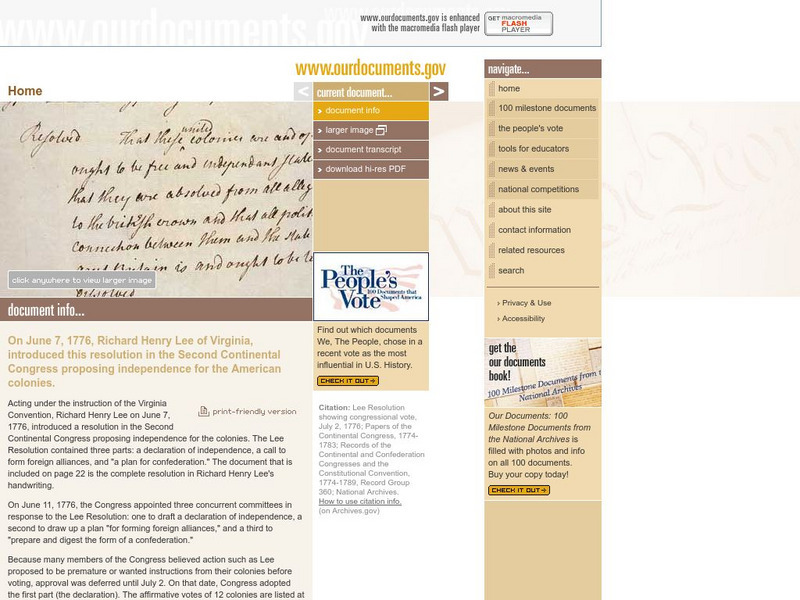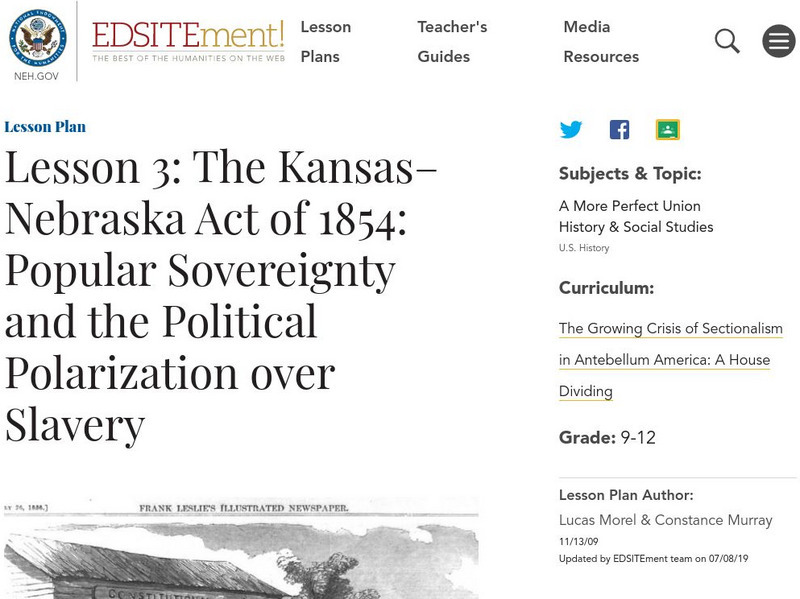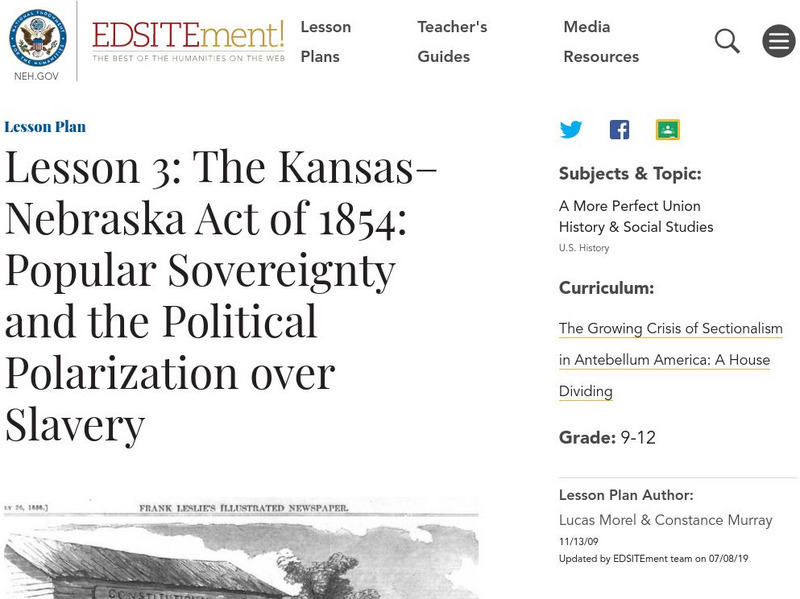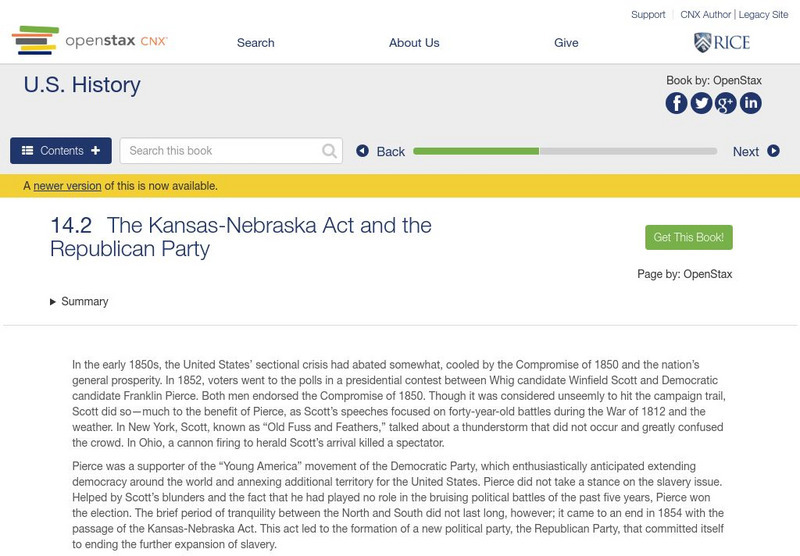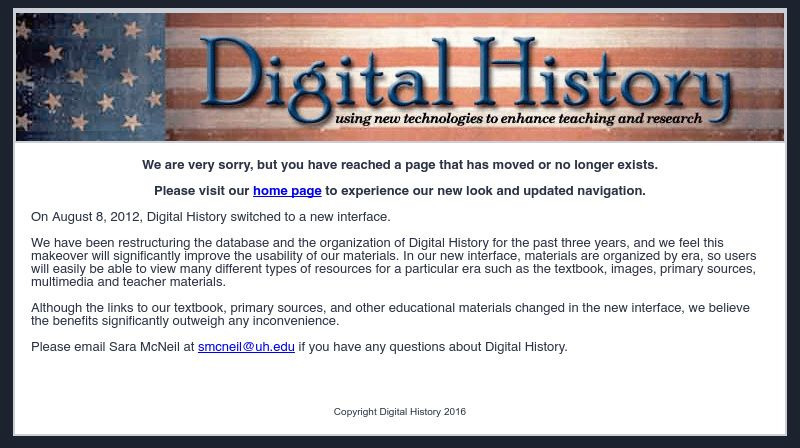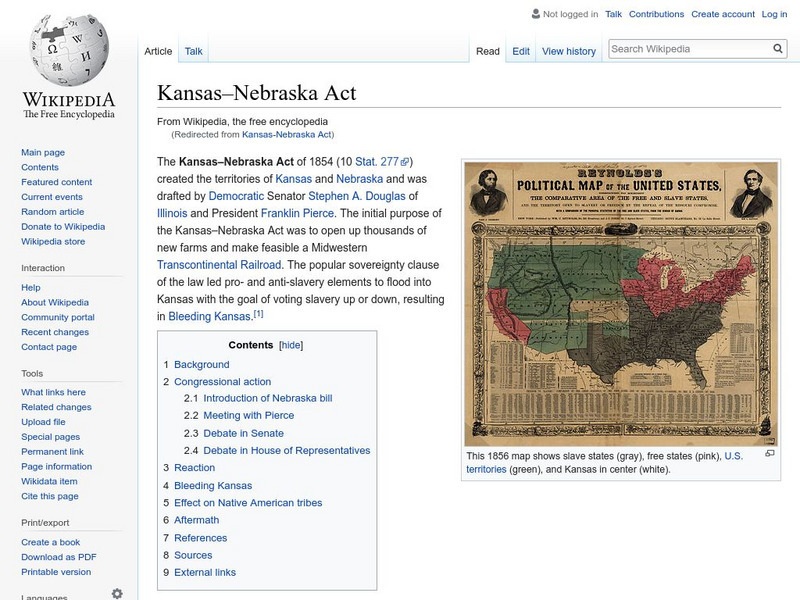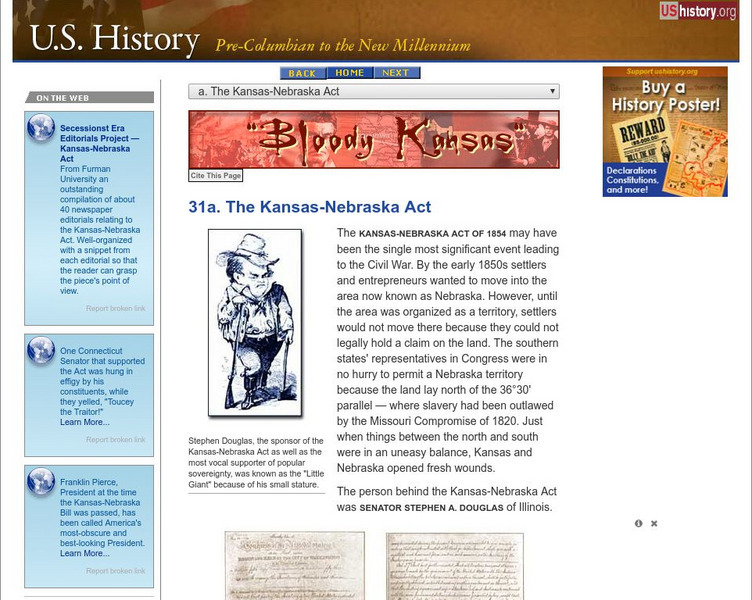Hi, what do you want to do?
Curated OER
The Kansas-Nebraska Act of 1854: Popular Sovereignty and the Political Polarization over Slavery
Why did Stephen Douglas support the Kansas-Nebraska Act of 1854? Why did Abraham Lincoln oppose it? Young historians examine how the Kansas-Nebraska Act of 1854 affected the political balance between free and slave states and explore how...
NET Foundation for Television
1850-1874 The Kansas-Nebraska Act
How the Kansas-Nebraska Act created Bleeding Kansas is complicated—until scholars research and examine documents from the time. After completing activities that include mapping, photo, document analysis, and discussion, learners...
Curated OER
Eli Thayer and the Kansas-Nebraska Act
Students determine how states were identified as slave states or free states. In this Kansas-Nebraska Act lesson, students explore the work of Eli Thayer as well as the work of Thayer's supporters in Massachusetts.
Curated OER
The Kansas-Nebraska Act of 1854: Popular Sovereignty and the Political Polarization over Slavery
Students read selections from the Declaration of Independence, Northwest Ordinance of 1787, and the Wilmot Proviso of 1846. They contrast the maps of 1820 and 1854 to analyze developments in the national debate over slavery. They...
National Constitution Center
Abraham Lincoln's Crossroads
History enthusiasts participate in an interactive website that brings Abraham Lincoln to life as he shares his personal experiences between 1854-1864. Scholars listen and read carefully to form their own opinions and discover if they...
Curated OER
How We Got to Kansas-Nebraska
Students explore the causes of the Civil War. In this lesson on slavery students use primary sources to examine the evolution of the issue of slavery and in the American political system. Students will then write a follow-up essay...
Curated OER
Sectionalism
Students examine sectionalism. In this sectionalism instructional activity, students explore reasons sectionalism developed. Students realize the conflicts that led to the Civil War and how sectionalism affected citizens on the...
Film Education
Glory
If you are previewing the film Glory for your young historians, this packet may help you spark ideas for discussion and offer some interesting facts and quotations that may add to your presentation of this Civil War narrative. It...
Curated OER
A Nation Divided: Why Couldn't They Just Get Along?
Fourth graders examine both perspectives of the Civil War as related to the differing economies. In this nation divided lesson, 4th graders view primary sources, examine paper money and a political chart, and review recruitment...
Curated OER
Fact and Opinion Pre-Test
For this fact/opinion worksheet, students complete 10 multiple choice questions. Students may click on a link to view correct answers.
US National Archives
Our Documents: The Kansas Nebraska Act
An outstanding, interactive copy of the Kansas-Nebraska Act, the legislation that repealed the Missouri Compromise. Historical context included, as well as links to larger images, a typed transcript, and a downloadable PDF file.
National Endowment for the Humanities
Neh: Edsit Ement: The Kansas Nebraska Act of 1854
An exploration of how the Kansas-Nebraska Act of 1854 impacted the debate between free and slave states, and the precarious political equilibrium. It looks at how Stephen Douglas tried to avoid a national conflict in the debate over...
National Endowment for the Humanities
Neh: Edsit Ement: Lesson3: The Kansas Nebraska Act of 1854: Popular Sovereignty
Lesson plan focuses on the Kansas-Nebraska Act of 1854, popular sovereignty, the political polarization over slavery, Stephen Douglas, and Abraham Lincoln. It provides four detailed activities for use with the lesson and includes...
Nebraska Studies
Nebraska Studies: Kansas Nebraska Act Signed
This is a narrative detailing the signing of the Kansas-Nebraska Act in 1854 and the controversy that grew from it.
OpenStax
Open Stax: The Kansas Nebraska Act and the Republican Party
Students will learn about the political ramifications of the Kansas-Nebraska Act and the founding of the Republican Party.
Digital History
Digital History: The Kansas Nebraska Act
An explanation of how the Kansa-Nebraska Act in effect voided the Missouri Compromise, which had been the law that dictated the territories that could allow slavery. Read about the act proposed by Stephen A. Douglas, and see how a...
University of Oregon
University of Oregon: Mapping History: Kansas Nebraska Act: 1854
Toggle back and forth on this interactive map to see how the Kansas-Nebraska Act of 1854 completely negated the Missouri Compromise. Click on the map to see where slavery was permitted before 1854 and then after. Be sure to click on the...
Yale University
The Avalon Project: Kansas Nebraska Act 1854
The complete text of the Kansas-Nebraska Act, called an Act to Organize the Territories of Nebraska and Kansas.
PBS
Pbs Learning Media: 1850 1874 Era | Lesson 1: The Kansas Nebraska Act
The Kansas-Nebraska Act of 1854 created a territory that stretched all the way north from the southern boundary of present-day Nebraska to include all of the remaining lands of the Louisiana Purchase.
University of Groningen
American History: Essays: Politics and Sectionalism: Kansas Nebraska Act
Discusses what led up to the Kansas-Nebraska Act of 1854, and the role Illinois Senator Stephen Douglas played in developing it.
Khan Academy
Khan Academy: The Kansas Nebraska Act and Party Realignment
Learn about the Kansas-Nebraska Act. Passed in 1854, it reopened the debate over the expansion of slavery in the United States.
Civil War Home
Home of the American Civil War: The Kansas Nebraska Act
Provides information on the Kansas-Nebraska Act and the consequences of its passing. From "The Civil War and Reconstruction" by Randall and McDonald.
Wikimedia
Wikipedia: Kansas Nebraska Act
Wikipedia offers excellent information on the Kansas-Nebraska Act of 1854.
Independence Hall Association
U.s. History: The Kansas Nebraska Act
Read about the essential repeal of the Missouri Compromise, which had established which states could be slave and which would be free for thirty years, with the rancorous passage of the Kansas-Nebraska Act. See who supported it and why,...















